Originally posted by chithanh
View Post
Originally posted by chithanh
View Post
In a few years there will be the same problem with PulseAudio or X11, while Windows users will still be able to use software for Windows 95 or XP... on the current Windows version.



Comment